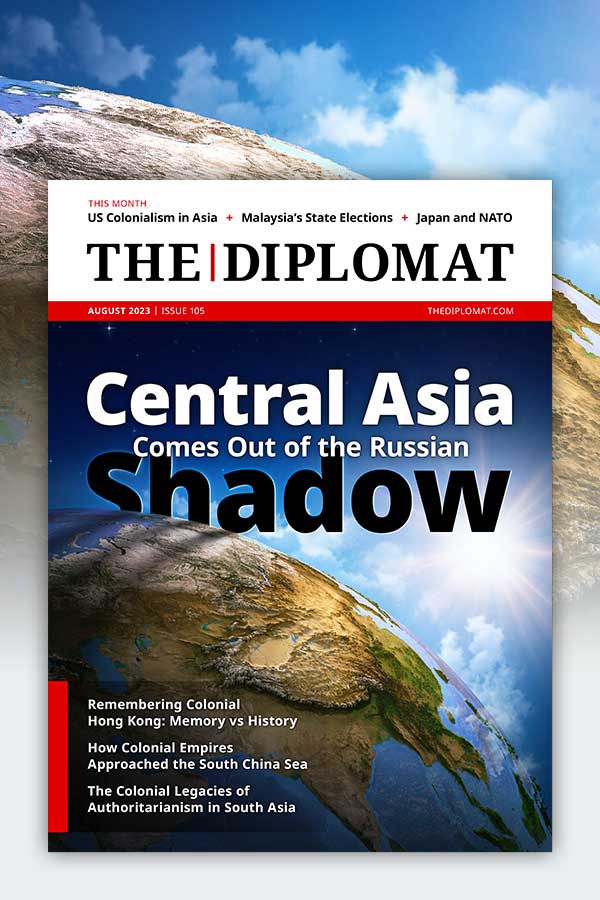| Welcome to the latest issue of Diplomat Brief. This week our top story explores how the Taliban defend their border, based on an exclusive embed with border guards in Badakhshan Province. We also have an interview with Bridget Welsh, Honorary Research Associate with the University of Nottingham Asia Research Institute Malaysia (UoNARI-M), on Malaysia’s state elections and the implications for Anwar Ibrahim’s government. |
| Story of the week | ![[object Object]](https://thediplomat.com/diplomat-brief/2023/vol32/images/feature.jpg?v=2) | Security How the Taliban Guard Afghanistan’s Border (and What It Says About Their Regime)What Happened: When the Taliban took full control of Afghanistan in August 2021, many foreign governments – especially those in Afghanistan’s neighbors – worried about the spillover effects. Would the Taliban fail to govern and leave space ready to be exploited by international jihadists and narcotics smugglers? Two years later, the worst fears – another all-out civil war, state collapse, and utter chaos – have not been borne out. However, while the Taliban are performing the visible functions of guarding their borders, the actual day-to-day reality of operations leaves much to be desired. Our Focus: Franz J. Marty, a freelance journalist who just departed Afghanistan this summer, after spending almost nine years in the country, became the first journalist allowed to embed with the Taliban border forces. From the Afghanistan-Tajikistan border, Marty reports persistent supply and logistical issues, from a lack of uniforms and ammunition to soldiers forced to patrol vast areas on foot. But perhaps most concerning, the Taliban border forces deny that the problems their neighbors are most worried about – drug smuggling and cross-border terrorism – exist at all. “It’s all lies,” as one Talib insisted. Instead, their patrols look for largely imagined threats from the National Resistance Front – and, in one bizarre case, a snake. What Comes Next: “The Taliban’s paranoia about hardly active armed resistance and their blatant denial of other cross-border threats that worry neighboring states and the wider international community… do not bode well for any interaction between the Taliban and other states,” Marty concludes. “The fact that Taliban border guards in Badakhshan are indeed thinly spread and not only ignore but outright deny clearly existing concerns of illegal crossings… is a worrisome mix.” Read this story |
| Behind the News | INTERVIEW Bridget WelshBridget Welsh, Honorary Research Associate with the University of Nottingham Asia Research Institute Malaysia (UoNARI-M), on the national implications of Saturday’s state elections in Malaysia: “The stakes are high as a change of government in [Negeri Sembilan and Selangor] states will impact Malaysia’s economic recovery, investment prospects, and reflect growing ethnic polarization, making the country harder to govern.” Read the interview |
| This Week in Asia | Northeast Asia Taiwan’s VP Transits the U.S.Taiwan’s Vice President – and presidential candidate for the ruling DPP – William Lai is set to transit the United States this week on his way to and from Paraguay. He will stop in New York on August 12 and in San Francisco on August 16. While Lai’s rivals in Taiwan’s 2024 presidential election either have already or will soon make far more extensive tours, Lai’s is the focus of China’s criticism – both because he is a sitting government official, and because Lai is seen as “pro-independence” by Beijing. China may respond with military drills or other provocations. Find out more | South Asia Imran Khan Goes to JailAfter a near-constant barrage of legal charges since his ouster from office in April 2022, Pakistan’s former Prime Minister Imran Khan is in jail, pending an appeal of his conviction. He was sentenced to three years on corruption charges, in what Khan and his party say is a politically motivated farce. Khan was widely expected to be officially sidelined ahead of elections, but it remains to be seen how his large support base will respond. Find out more | Southeast Asia Cambodian King Appoints Strongman’s Son PMKing Norodom Sihamoni this week officially appointed Hun Manet the country’s next prime minister, in line with a transition plan formulated by his father, Hun Sen. The appointment marks the end of Hun Sen’s more than 38-year reign. Hun Manet’s ascension follows a national election on July 23, at which the ruling Cambodian People’s Party (CPP) won 120 of the 125 seats in Parliament, after the country’s main opposition party was barred from participating. Hun Manet will take office on August 22, pending a parliamentary vote of confidence. While it remains to be seen what kind of leader the 45-year-old will be, his decisions are likely to be significantly shaped by the nature of the political system created by his father. Find out more | Central Asia The Shadow War in Kazakhstan: Language PoliticsAs Russian forces pursue a physical war in Ukraine, a shadow war is being fought too: a war against the legacies of Russian imperialism. One of the fronts of this war is language. In Kazakhstan, there has been a surge in interest in not just learning the Kazakh language but discussing Kazakhstan's history on Kazakh terms – ending the use of Russian euphemisms that serve to disguise Moscow’s imperial sins. Find out more |
| Visualizing APAC |  | Besides the United States, 15 other states sent troops to the United Nations Command during the Korean War – and many of these same countries still deploy small numbers of troops on the Korean Peninsula today. See the full picture |
| Word of the Week | Politics Манку́ртMankurt, a term coined by Kyrgyz writer Chingyz Aitmatov in his novel “The Day Lasts More Than a Hundred Years,” refers to mindless slaves who suffered torture that erased their memory of self and homeland. Find out more |
|  |

![[object Object]](https://thediplomat.com/diplomat-brief/2023/vol32/images/feature.jpg?v=2)

